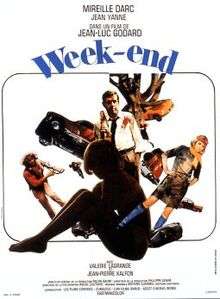Weekend (1967 film)
Weekend (French: Week-end) is a 1967 French black comedy[1][2] film written and directed by Jean-Luc Godard and starring Mireille Darc and Jean Yanne, both of whom were mainstream French TV stars. Jean-Pierre Léaud, comic star of numerous French New Wave films including Truffaut's Les Quatre Cent Coups (The Four Hundred Blows) and Godard's earlier Masculin Féminin, appeared in two roles. Raoul Coutard served as cinematographer; Weekend was his last collaboration with Godard for over a decade.
| Weekend | |
|---|---|
 theatrical release poster | |
| Directed by | Jean-Luc Godard |
| Produced by | Raymond Danon |
| Screenplay by | Jean-Luc Godard |
| Based on | La autopista del Sur by Julio Cortázar (uncredited) |
| Starring | Mireille Darc Jean Yanne |
| Music by | Antoine Duhamel |
| Cinematography | Raoul Coutard |
| Edited by | Agnès Guillemot |
| Distributed by | Athos Films |
Release date |
|
Running time | 105 minutes |
| Country | France |
| Language | French |
| Budget | $250,000 (estimated) |
The film was nominated for the Golden Bear at the 18th Berlin International Film Festival in 1968.[3][4]
Plot
Roland (Jean Yanne) and Corinne (Mireille Darc) are a bourgeois couple. Each has a secret lover and conspires to murder the other. They drive out to Corinne's parents' home in the country to secure her inheritance from her dying father, resolving to resort to murder if necessary.
The trip becomes a chaotically picaresque journey through a French countryside populated by bizarre characters and punctuated by violent car accidents. After their own Facel-Vega is destroyed in a collision, they wander through a series of vignettes involving class struggle and figures from literature and history, such as Louis Antoine de Saint-Just (Jean-Pierre Léaud) and Emily Brontë (Blandine Jeanson).
When Corinne and Roland eventually arrive at her parents' place, they discover that her father has died and her mother refuses to give them a share of the spoils. They kill her and hit the road again, only to fall into the hands of a group of hippie revolutionaries (calling themselves the Seine and Oise Liberation Front) that support themselves through theft and cannibalism. Killed during an escape attempt, Roland is chopped up and cooked.
Cast
- Mireille Darc as Corinne
- Jean Yanne as Roland
- Paul Gégauff as Pianist
- Jean-Pierre Léaud as Saint-Just
- Blandine Jeanson as Emily Brontë
- Yves Afonso as Tom Thumb
- Juliet Berto as The Radical
Background
According to a letter from the Argentine writer Julio Cortázar to his translator Suzanne Jill Levine, the indirect inspiration for the movie was Cortázar's short story "The Southern Thruway." Cortázar explained that while a British producer was considering filming his story, a third party presented the idea to Godard, who was unaware of its source. Because he had had no input on the making of the film, Cortázar vetoed the suggestion to translate the story's title as "Week-End" to take advantage of the tie-in.[5]
Themes and style
Weekend has been compared to Alice in Wonderland, the James Bond series, and the works of Marquis de Sade.[6][7] Tim Brayton described it as a "film that reads itself, tells the viewer what that reading should be, and at the same time tells the viewer that this reading is inaccurate and should be ignored."[8] In one of the first scenes Corinne tells her lover about a sexual experience she had. Part of the story she tells is based on George Bataille novel Story of the eye (Histoire de l'œil). [9]
References
- Lorefice, Mike (15 March 2004). "Week End". Raging Bull Movie Reviews. Retrieved 3 July 2018.
- Movie Gazette (2 March 2005). "Week End (1967)". Movie Gazette. Web Gazette. Retrieved 17 September 2010.
- "18th Berlin International Film Festival: June 21 - July 2, 1968". Annual Archives: 1968. Berlin International Film Festival. Retrieved 8 January 2009.
- "Weekend (1968): Awards". IMDb. Retrieved 9 January 2009.
- Cortázar, Julio. Cartas (2012) tomo 4 p.292.
- Hoberman, J. (5 October 2011). "Weekend: When Godard Burned the Movie House Down". Village Voice. Retrieved 15 February 2017.
- "Weekend Reviews". Rotten Tomatoes. Fandango Media. Retrieved 3 July 2018.
- Brayton, Tim (21 January 2008). "Week End (1967)". Alternate Ending. Retrieved 15 February 2017.
- Hibernan, J. (5 October 2008). "Week End: When Godard burned the movie house down". The Village Voice. Retrieved 16 April 2020.
External links
- Weekend on IMDb
- Weekend at Rotten Tomatoes
- The Last Weekend an essay by Gary Indiana at the Criterion Collection